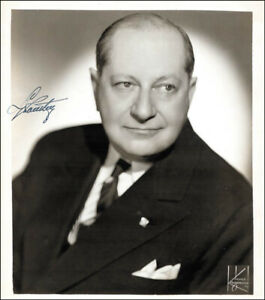In the years following World War I, America was a study in musical & social contrasts. On one hand, it was the Roaring Twenties, skirts were high, morals loose, the music fast & jazzy. On the other hand, ultra-romantic operettas written by classically trained European émigrés were at their peak of popularity, and few were as consistently successful as those composed by Sigmund Romberg.
Born in Hungary in 1887, Romberg studied engineering before escaping to America to pursue a musical career. The young musician would advance from playing piano to the position of orchestra leader and composer at some of Manhattan’s most fashionable restaurants. Ultimately, his composing talent would lead to steady employment on Broadway, mostly with the Schubert Brothers. After a first major success with the Franz Schubert-themed MAYTIME in 1917, Romberg’s operettas would prove to be some of the most popular musical theatre works of the 1920s: THE STUDENT PRINCE (1924), THE DESERT SONG (1926) and THE NEW MOON (1928).
Romberg’s greatest songs, drawn mostly from these Broadway productions, continue to charm any lover of luscious, romantic melody: “Golden Days,” “Drinking Song,” “Serenade,” “Deep In My Heart,” “The Riff Song,” “The Desert Song,” “Romance,” “One Alone,” “Stouthearted Men,” “Softly As In a Morning Sunrise,” “Wanting You,” “Lover Come Back To Me,” “When I Grow Too Old To Dream,” “April Snow,” “The Fireman’s Bride,” “Close As Pages in a Book,” “Lost in Loveliness.”
Later on in Hollywood, Romberg would contribute to many movie musicals. Remarkably, he managed to outlast all other operetta composers by extending his creative activity right thru the 1940s (UP IN CENTRAL PARK) and even into the early 1950s (THE GIRL IN THE PINK TIGHTS).
As Romberg himself stated, “Nothing succeeds like a popular tune – a romantic tune. Romantic music will never die because deep at the roots of all people is the theme of love.”
If you would like to engage Fred Miller for one of his Lectures-in-Song, please contact him directly at any time. For a full listing of all Lectures, click here.
Fred Miller’s Lectures-In-Song comprise a series of solo programs, each an historical, anecdotal and musical profile of some great personality or important aspect of American Popular Song. These Lectures are delivered by singer/pianist/narrator Miller at the piano, and each reflects his lifetime passion and appreciation for great music. He studied classical piano in his hometown of Albuquerque from ages 7-15 but early on gave up any notion of music as a profession. At that time, Fred assumed a musical career was either one devoted to the rigid discipline of classical music or being a freewheeling rock star, and he accurately decided he had no aptitude for either. However, at age 22, upon hearing Ella Fitzgerald sing Cole Porter, he found his calling and life’s mission.
Through the Seventies and Eighties, Miller studied and absorbed in minute detail the life and times and songs of nearly all the great American composers and lyricists who thrived during Broadway & Hollywood’s Golden Age between the two World Wars. In 1987, he founded Silver Dollar Productions in order to produce operettas, dramas, musicals and small cabarets. Silver Dollar Productions required ensemble casts, props, costumes and, most significantly, the challenges of publicity and selling tickets, and for a dozen busy years, the company presented an unbroken string of varied and highly lauded performances.
In 1999, Miller was simultaneously underwritten by both his local Hunterdon County Library and the Art Alliance of Philadelphia to present a series of six solo Lectures-In-Song, each devoted to one of the premiere Broadway/Hollywood songwriters: George Gershwin, Cole Porter, Irving Berlin, Richard Rodgers, Jerome Kern, and Harold Arlen.
In presenting history, biography and psychology while sitting at a piano singing the superlative songs of his heroes, Miller has found a single performing medium that utilizes most of his intellectual and musical passions.The list of Lectures-In-Song that began with six in 1999 is now more than seventy(and growing!), a joyful tribute to the boundlessly rich field of American Popular Song.

